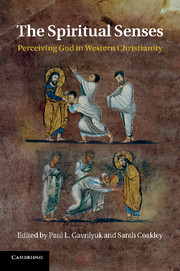Book contents
- Frontmatter
- Contents
- Contributors
- Foreword
- Abbreviations
- Introduction
- Chapter 1 Origen of Alexandria
- Chapter 2 Gregory of Nyssa
- Chapter 3 Augustine
- Chapter 4 Gregory the Great
- Chapter 5 Pseudo-Dionysius the Areopagite
- Chapter 6 Maximus the Confessor
- Chapter 7 Alexander of Hales
- Chapter 8 Thomas Gallus
- Chapter 9 Bonaventure
- Chapter 10 Thomas Aquinas
- Chapter 11 Late medieval mystics
- Chapter 12 Nicholas of Cusa
- Chapter 13 Jonathan Edwards and his Puritan predecessors
- Chapter 14 John Wesley
- Chapter 15 Karl Rahner and Hans Urs von Balthasar
- Chapter 16 Analytic philosophers of religion
- Select bibliography
- General index
- Index of select biblical references
- References
Chapter 16 - Analytic philosophers of religion
Published online by Cambridge University Press: 05 December 2011
- Frontmatter
- Contents
- Contributors
- Foreword
- Abbreviations
- Introduction
- Chapter 1 Origen of Alexandria
- Chapter 2 Gregory of Nyssa
- Chapter 3 Augustine
- Chapter 4 Gregory the Great
- Chapter 5 Pseudo-Dionysius the Areopagite
- Chapter 6 Maximus the Confessor
- Chapter 7 Alexander of Hales
- Chapter 8 Thomas Gallus
- Chapter 9 Bonaventure
- Chapter 10 Thomas Aquinas
- Chapter 11 Late medieval mystics
- Chapter 12 Nicholas of Cusa
- Chapter 13 Jonathan Edwards and his Puritan predecessors
- Chapter 14 John Wesley
- Chapter 15 Karl Rahner and Hans Urs von Balthasar
- Chapter 16 Analytic philosophers of religion
- Select bibliography
- General index
- Index of select biblical references
- References
Summary
In 1901 Robert Campbell Moberly (1845–1903), the distinguished Anglican theologian, published a lengthy book on the atonement entitled Atonement and Personality. Buried in the middle of it is a chapter that sketches an interesting analysis of the concept of reason in theology. The vision of reason is nicely sandwiched between an account of human agency and of the capacity to love in a chapter entitled ‘The Holy Spirit in Relation to Human Personality’. This trinity of topics fitted neatly together for Moberly in two distinct ways. First, he insisted that in each case a proper understanding of these concepts begins with our initial and inchoate grasp of these notions and then moves to a richer account engendered by his robust trinitarian theology. Second, the proper functioning of human agency, human reason and the capacity to love are intimately related, so that reason, as applied in theology, depends on proper human self-realization brought about by radical submission to Christ through the Spirit and resulting in an emancipation that brings true love to expression in human relations.
Moberly is operating in a tradition that depicts reason as a faculty. In its initial manifestation the exercise of this ‘rational’ faculty takes the prosaic form of question and answer, comparison, inference and discovery. This is reason operating in the early stage of development. Reason at this level is infantile; using it in this manner is like acquiring the capacity to walk; it is really the ‘grating and creaking of the machinery’ in its initial operations. Thus this cannot be the essence of reason. Reason in its most serious sense is ‘the capacity of personal insight into reality – of all kinds, and most of all whatever is highest and most inclusive as reality’. It is the ‘personal capacity of beholding wisdom and truth’. This vision of reason fits snugly with a hierarchy of truths. ‘Truth of course is manifold and multiform. There are truths of material fact: truths of abstract statement; truths of historical occurrence; truths of moral experience; truths of spiritual existence; and that truth is deepest and truest which most includes and unifies them all.’ It also fits snugly with the clear remnants of an Idealist metaphysics which are peeping through the surface of his thinking.
- Type
- Chapter
- Information
- The Spiritual SensesPerceiving God in Western Christianity, pp. 275 - 290Publisher: Cambridge University PressPrint publication year: 2011
References
- 1
- Cited by



